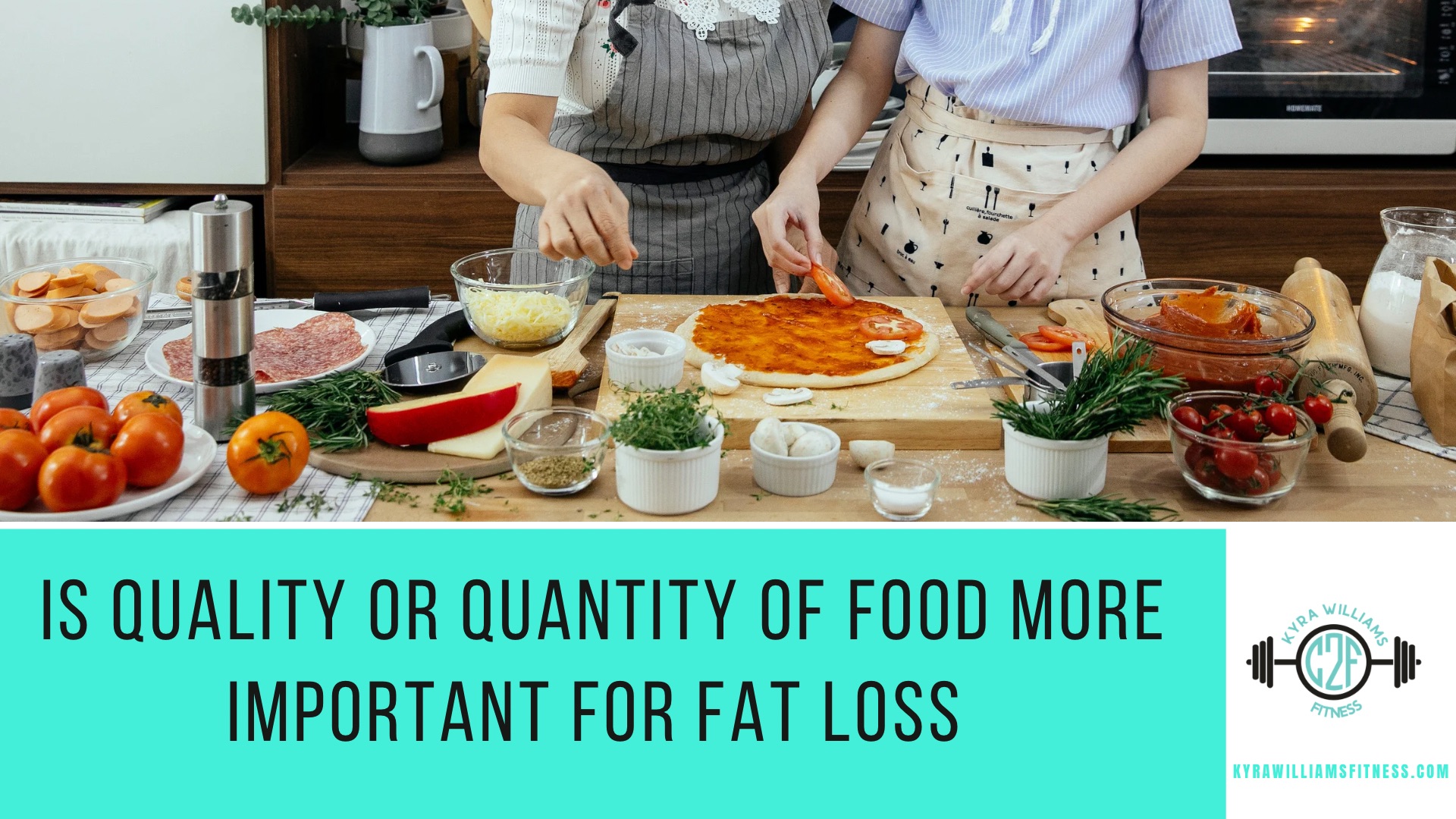Is quality or quantity of food more important for fat loss and creating a lean physique? Before diving into a binary answer, both really need to be explored. First let’s begin by defining what food quality involves..
Looking at food quality can mean a few different things.
Does the food contain a bunch of coloring, preservatives, artificial sweeteners, or other ingredients that have adverse affect on our health? Is the food supposed to be a good source of protein but filled with added soy just to bump up that number? Is it highly processed? Does the food contain nutrients/ is it nutrient dense?
We also have to consider the quality of food as it pertains to your specific needs. For example, if you experience auto immunity, foods that contain gluten are low quality for you, mores than others. Or if you are experiencing menopause, foods that are low in protein are not high quality for your needs. A food that is high quality for one person may not be high quality for you.
Generally speaking, high quality foods contain natural ingredients (or be the ingredient itself) that are nutrient dense, are responsibly sourced, contain no artificial ingredients, improve our health and work for our bodies. Whole food examples may include grass fed steaks, free range eggs or egg whites, bananas, quinoa, avocados, cashews and black beans. Packaged food examples may include RX bars, certain brands of breakfast sausage, bakery fresh sourdough bread, almond butter, dried fruit without sugar, kimchi, olive oil and certain brands of jerky.
If you want to dive in on controversial ingredients, Food Babe has a comprehensive list you can read here. https://foodbabe.com/ingredients-to-avoid/
I also recommend learning the dirty dozen, to learn which types of produce should be purchased organic if possible. This can reduce exposure to the carcinogen, glyphosate, sprayed on our foods. https://www.ewg.org/foodnews/dirty-dozen.php
The reason quality is so important is because of how food impacts our health.
When we consume food, we absorb the food particles that ultimately break down into useable chemical compounds and waste. The more micronutrients that are in our food, the more of it we can use for functions like bone density, muscle contraction, respiration, neurotransmitter and hormone functioning. If we cannot do these things because we are deficient, forget fat loss.
Now let’s look at what must be considered when discussing food quantity and fat loss. The simplest place to start is the amount of calories in the food compared to your specific needs. To lose weight you must be in a caloric deficit. This means you burn more calories than you consume over a given span of time. If you burn 2300 calories a day, you must consume less than 2300 a day.
But that isn’t the only quantifiable data point that comes with food. There are also the macronutrients of food – protein, carbohydrates and fat, each of which are important in a well rounded diet. A very standard approach to eating a diet well rounded in these macronutrients is to consume 40 percent of your calories from carbohydrates, 30 percent from protein and 30 percent from fat.
So when we look at food quantity, it’s important to consider you are eating the appropriate amount of calories each day, as well as protein, carbohydrates and fat. All of these things, not just calories, can be manipulated to help you lose fat. If you consume adequate protein with each meal, you can balance your blood sugar which aids in fat loss. If you consume carbohydrates post workout, this can help decrease cortisol and helps shuttle protein in the blood faster which aids in recovery.
Food quality and food quantity are important to overall health and well being and should be considered in your fat loss goals and here is why..
If you only consider food quantity and you eat in a deficit, you may lose fat quickly. But when you hit a plateau you will have to cut calories further, which can be detrimental to your health. Too few calories can also mean you are not able to consume enough nutrients, which leads to deficiency. This could mean you have very low energy and lose motivation. It may mean you aren’t pooping regularly and end up bloated so no amount of fat loss matters. Perhaps it gets so bad you have muscle cramps or bone fractures and can’t train.
On the other hand, if you only consider quality you can’t guarantee fat loss. This doesn’t involve a calorie deficit or balancing your blood sugar, both of which are necessary for fat loss. If you ate 1800 calories in quinoa, lentils, apples and buckwheat noodles every day, you could be in a deficit, but your blood sugar is going to be going through so many peaks and valleys the insulin response is not going to allow for fat loss.
Ultimately everything needs to be well rounded. I suggest creating a calorie deficit based on your needs and goals, consuming well rounded meals that include protein, carbohydrate and fat sources from high quality foods with minimal ingredients, and doing your best to have as much variation in those foods as possible. You can also consult weight loss services to know what’s best for your goals.
Your Coach,
Kyra
